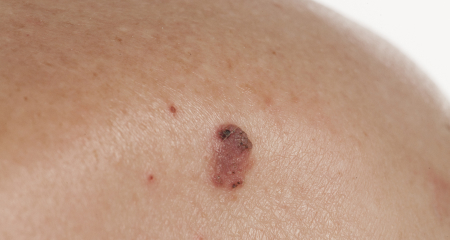
Melanoma is the most dangerous form of skin cancer, though it is also the rarest. It has the potential to spread rapidly to the lymph nodes and internal organs, which can be life-threatening. Thankfully, melanoma is highly treatable when caught early. If you notice a new or changing spot, it’s essential to contact your specialist at Northstar Dermatology promptly for evaluation.
Melanoma arises from abnormal mutations in melanocytes, the cells responsible for producing skin pigment. While melanoma can affect people of any skin type, certain factors may heighten the risk of developing this serious form of skin cancer.
Chances of developing Melanoma may increase from:
• History of prolonged sun exposure or indoor tanning
• History of blistering sunburns
• Having fair skin, light-colored eyes, or naturally red or blonde hair
• Having a large number of moles
• A family history of Melanoma
Melanoma is the most dangerous form of skin cancer, but it is highly treatable when detected early. Regular skin exams with a board-certified dermatologist can aid in identifying signs of melanoma. Additionally, self-skin checks can help you recognize the warning signs of melanoma early on.
Check your moles for the following:
• Asymmetry: one half doesn’t mirror the other
• Border: blurred, uneven, or scalloped mole edges • Color: multiple hues within a single mole
• Diameter: noticeable growth in mole size
• Evolution: the spot looks different from the rest or is changing in size, shape, or color If a mole exhibits any of these traits, be sure to request a Skin Cancer Screening with a specialist at Northstar Dermatology
At Northstar Dermatology, our physicians specialize in the surgical treatment of melanoma. The most common approach is surgical excision, in which the dermatologist carefully removes the cancerous tissue along with a surrounding margin to ensure complete clearance. The area is then sutured, and some downtime, including limitations on lifting and physical activity for a few weeks, will be required.
In certain cases, treatment may involve a referral to a Mohs surgeon. If melanoma has advanced to a particular stage, an oncologist may also be consulted for further treatment options.
If you are diagnosed with melanoma, it is crucial to follow up with your dermatologist promptly, as melanoma can progress rapidly. Your board-certified dermatologist will guide you on the most effective treatment plan for your specific situation.
